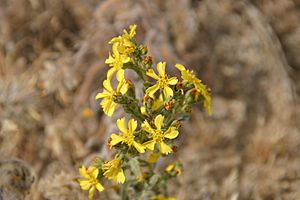Deinandra kelloggii facts for kids
Quick facts for kids Deinandra kelloggii |
|
|---|---|
 |
|
| Scientific classification | |
| Kingdom: | |
| (unranked): | |
| (unranked): | |
| (unranked): | |
| Order: | |
| Family: | |
| Genus: | |
| Species: |
D. kellogii
|
| Binomial name | |
| Deinandra kelloggii (Greene) Greene
|
|
| Synonyms | |
|
|
Deinandra kelloggii, also called Kellogg's spikeweed or Kellogg's tarweed, is a plant found in North America. It belongs to the tarweed tribe, which is part of the big sunflower family. This plant grows naturally in Baja California, parts of California, and Arizona.
Discovering Kellogg's Spikeweed
Kellogg's spikeweed is a fascinating plant. It's known for its unique flowers and where it chooses to grow. Learning about plants like this helps us understand the natural world around us.
Where Kellogg's Spikeweed Lives
This plant is native to North America. You can find it in Baja California, which is a state in Mexico. It also grows across a large part of California. This includes areas from Sonoma and Calaveras Counties in the north, all the way down to San Diego County in the south. You can also spot it in Pima County, Arizona.
What Kellogg's Spikeweed Looks Like
Kellogg's spikeweed is an annual herb. This means it completes its whole life cycle, from seed to flower to new seeds, within just one year. It can grow quite tall, sometimes reaching up to 150 centimeters, which is about 5 feet!
The plant produces many flower heads. Each flower head has two main parts. There are 5 yellow ray florets, which look like petals around the edge. In the center, there are 6 disc florets. These disc florets have yellow corollas, which are like the flower's inner petals. The anthers inside the disc florets can be yellow, red, brown, or even maroon.
 | Laphonza Butler |
 | Daisy Bates |
 | Elizabeth Piper Ensley |

